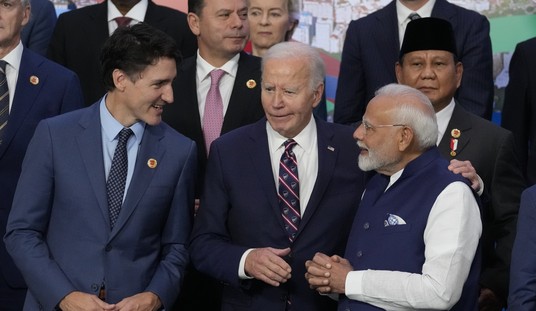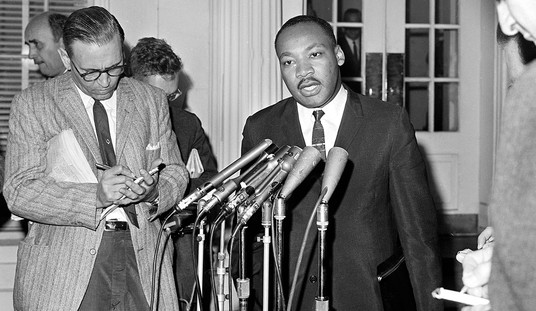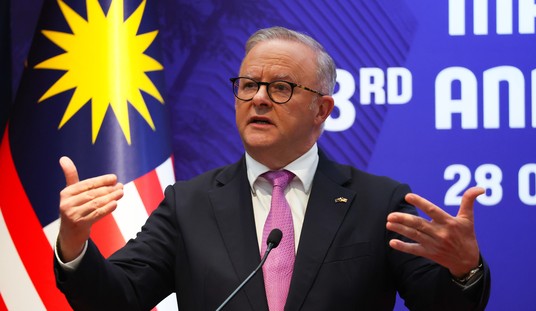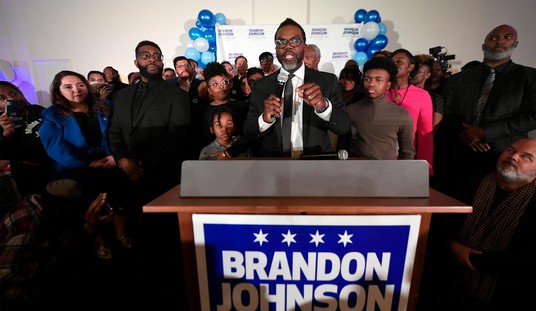Every stakeholder has had something to say about Donald Trump’s decision to meet with Kim Jong-un — except for one in particular. The South Koreans announced the invitation from the North Korean leader; Trump and his administration made a public show of accepting it; even Russia and China have offered public encouragement. The American media talks continually about it, at least when they take a break from coverage of the more pressing and existential issue of Stormy Daniels.
So who’s the party pooper? Despite rarely missing a chance to comment on events in the region, the Kim regime itself is maintaining a “deafening silence” on the invitation, AFP reports:
Pyongyang has maintained a deafening silence as news that US President Donald Trump will meet its leader Kim Jong Un made global headlines — and analysts say the nuclear-armed North is keeping its powder dry, retaining room to manoeuvre.
Trump last week agreed to meet with Kim by the end of May to discuss Pyongyang’s denuclearisation — which it put on the table in exchange for security guarantees — and predicted the talks would be a “tremendous success”.
But the unorthodox announcement was made on the White House lawn by a South Korean envoy, with no American officials in attendance, and only confirmed by Washington afterwards.
More than 72 hours later, there has been no comment by the North, and nothing on the subject in its official media.
Rex Tillerson confirmed it this afternoon:
#BREAKING US still has "not heard anything directly back" from North Korea, US Secretary of State Rex Tillerson says
— AFP News Agency (@AFP) March 12, 2018
That does seem curious, especially given the impulse by DPRK’s state-run media to spin everything for the benefit of Dear Leader. Perhaps they got taken by surprise by the high-profile announcement from South Korea on Thursday, but that doesn’t account for 72 hours of radio silence on the matter. Some are questioning whether Seoul got out ahead of its skis:
“I think North Korea needs time to organize their position and is being careful and cautious in approaching regarding the summit,” said Unification Ministry spokesman Baik Tae-hyn. “In the meantime, the Unification Ministry will play an appropriate (and) central role in carrying out this process.”
Mike Chinoy, CNN’s former senior Asia correspondent and author of “Meltdown: The Inside Story of the North Korean Nuclear Crisis,” said “an asterisk” would hover above the talks until North Korea officially confirms its buy-in. He said that, in delivering the invitation to Trump orally, it was possible that the South Korean envoys may not necessarily have accurately conveyed to the US leader what Kim said, “let alone what he meant,” without a written record of the invitation.
“It’s all well and good that they’re making friendly noises to one another, (but) to take what a South Korean official says at face value without any formal confirmation from Pyongyang is very odd,” he told CNN.
On the other hand, North Korea hasn’t issued any denials, either, despite plenty of opportunities to declare this a false report or a misunderstanding. So why are they being so quiet, especially with Trump making claims about the preconditions of denuclearization being on the table and continuing joint military drills with the South being off limits? Bloomberg’s Kanga Kong suggests that Kim has decided to press forward with a final resolution of the Korean War in order to modernize his economy, and he’s waiting to see what the US will publicly suggest in exchange.
The sources for that are all south of the 38th Parallel, however:
Kim Jong Un wants to sign a peace treaty after meeting with U.S. President Donald Trump, South Korean media reported, reviving a long-held goal of the North Korean regime.
Kim is likely to raise the possibility of a peace treaty, along with establishing diplomatic relations and nuclear disarmament, during a meeting with the U.S. leader, the Dong-A Ilbo newspaper said Monday, citing an unidentified senior official in South Korea’s presidential office. Trump last week agreed to meet Kim, although key details of the summit have yet to be decided.
Koh Yu-hwan, who teaches North Korean studies at Dongguk University in Seoul, said the regime has long sought a peace treaty to end the more than 60-year-old ceasefire between the two sides and help guarantee its safety.
“There were agreements between the U.S. and North Korea to open up discussion on a peace treaty, but they never materialized,” Koh said, saying the conditions were key. “The U.S. wants a peace treaty at the end of the denuclearization process, while for the North, it’s the precondition for its denuclearization.”
Perhaps the answer to the silence is as simple as this old proverb: It is better to keep your mouth shut and be thought a fool than to open it and remove all doubt. So far, the US response has been positive and friendly, and that may be all Kim needs at this point. It’s possible — indeed, it’s quite likely — that all Kim really wants out of this meeting is to delay more pressure for several months on either side of a summit that doesn’t produce much of anything. Alternately, it’s also possible that sanctions have finally started to bite on the leadership caste in North Korea, and Kim needs to delay any rebellion by negotiating terms to end the standoff.
For now, though, the regime is keeping quiet. And that deafening silence speaks more to Kim’s need to change the terms of the debate than it does to maintain the status quo.








Join the conversation as a VIP Member